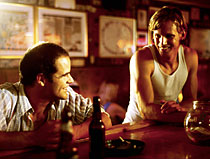Although "Loggerheads" director
Tim Kirkman is a proud Brooklynite, on the eve of his third film’s
opening, the filmmaker is in … Los Angeles.
Because he’s got lots to do – "checking the prints, doing
publicity, and gearing up for the release of ’Loggerheads’"
– in L.A., this Cobble Hill resident has to conduct a long-distance
telephone interview instead of chatting over coffee at a local
hangout.
Kirkman’s "Loggerheads," which will open in New York
City on Oct. 14, has played at festivals across the country (California,
Tennessee, Florida) since its premiere at Sundance last January.
His first attempt at narrative fiction – both writing and directing
– weaves together the stories of three characters whose lives
are affected by adoption.
But each of Kirkman’s three films has a unique sensibility. His
first film, the documentary "Dear Jesse," investigated
the political landscape of the anti-gay rights Sen. Jesse Helms,
but at the same time focused attention on Kirkman’s own life
growing up gay in the South.
"I was born in North Carolina," Kirkman told GO Brooklyn,
"and I have the deepest affection for my home state. But
it is a complicated relationship." He left North Carolina
for New York in the early ’90s, a time that was invigorating
to the young man.
"There was a wonderful political awareness then," Kirkman
recalled. "ACT UP [the gay activist organization] was doing
street theater. I learned a lot."
Kirkman describes himself at the time as "a gay tadpole!"
All of his work up to this point deals with different aspects
of life in America as a gay man.
While "Dear Jesse" is a personal documentary, his second
film, "The Night Larry Kramer Kissed Me," is "a
cinematic interpretation of a live show," according to Kirkman.
It documents a solo performance piece written and performed by
David Drake.
With "Loggerheads," he has leapt totally into fiction,
but the inspirations for the story are real. While shooting "Dear
Jesse" in 1997, he met a woman whose son died of AIDS. She
had given him up for adoption and later tried to find him, but
couldn’t because of North Carolina’s strict closed adoption laws.
"I think it’s outrageous that two adults who want to meet
each other are not allowed," said Kirkman. "I think
the two-party consent system is fair and takes into consideration
all of the people involved."
Kirkman, whose own family "was created, in part, by adoption,"
thought about making a documentary of the woman’s story, but
the lack of access to the subjects made it unfeasible. In the
fictional "Loggerheads," Kirkman chose to shine a light
on those real-life, restrictive adoption laws.
"[They’re] truly like apples and oranges," said Kirkman
about feature and documentary films. "There’s really no
comparison. With a documentary, you shoot material and then find
your story.
"With a narrative feature, while there are many adjustments
that can be made, the story can’t change that much once you’ve
got your script. Only when you talk about the technical side
do you find they have things in common."
"Loggerheads" tells a very subtle, yet intricate tale,
and Kirkman moves the action from one story to another, to another,
and back again. Each character’s narrative takes place on the
same weekend, but a year apart from the others, so the film encompasses
a three-year span.
Grace (Bonnie Hunt) has returned to her hometown to locate the
child she gave up for adoption years before. Mark (Kip Pardue),
drifting from town to town, meets a young man who, at least for
a time, offers him the companionship that he’s been longing for.
And Elizabeth (Tess Harper) struggles with her minister husband,
who has forced their gay, adopted son from home.
"It is a very complex script," said Kirkman. "I
wanted to tell three different stories with an interweaving narrative.
"We all receive information differently," he added.
"I don’t expect everyone to get it, but at the same time,
I don’t like confusion."
His desire to make things clear led him back to the editing room
after Sundance to make two subtle changes, including noting the
time each story takes place and changing the order of two scenes.
Gay themes and issues run through Kirkman’s movies, and he spoke
about his films thus far as a progressive trilogy, with "Dear
Jesse" being the most personal.
"The second film [’Larry Kramer’] empowered me as a gay
man, and this film [’Loggerheads’] has allowed me to step outside
of myself," he said.
But finally, all of Kirkman’s work is about the narrative.
At a screening during the Sundance festival, "an audience
member asked me if I had a gay agenda," recalled Kirkman.
"I said, ’My agenda is to tell good stories.’"
Marian Masone is associate
director of programming for the Film Society of Lincoln Center
and chief curator of the New York Video Festival at Lincoln Center.

























